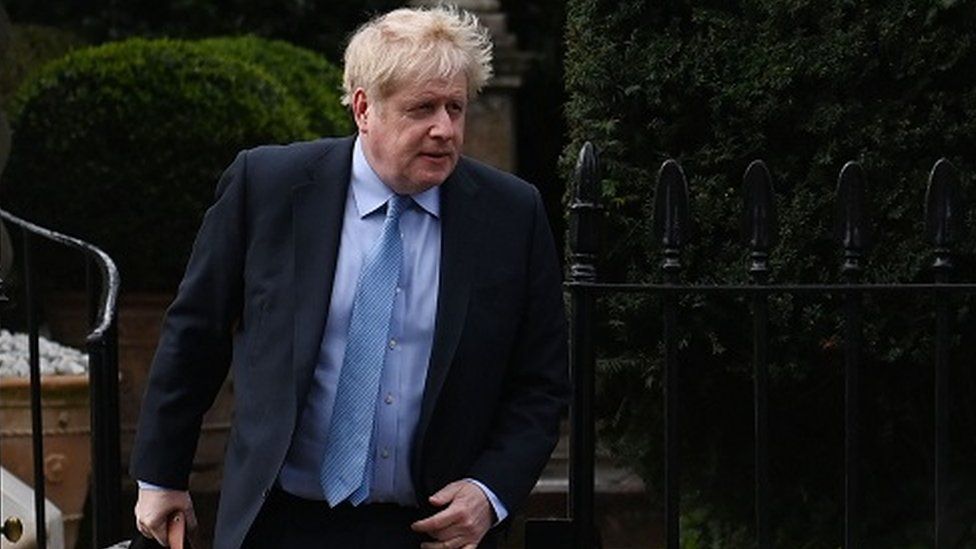
By Brian Wheeler & Chas Geiger
BBC News
Boris Johnson has committed a “clear breach” of the ministerial code by not clearing a new role writing a column for the Daily Mail with the parliamentary authorities.
The committee that vets ex-ministers’ appointments says he informed them only half an hour before the news emerged.
The first weekly column by the former prime minister appeared online late on Friday afternoon.
The paper was one of Mr Johnson’s staunchest supporters when he was PM.
Mr Johnson resigned as an MP on Monday, but is still required to seek advice from the Advisory Committee on Business Appointments (Acoba) on new jobs for two years after leaving ministerial office.
He stepped down as prime minister last September.
In a statement, Acoba said: “The ministerial code states that ministers must ensure that no new appointments are announced, or taken up, before the committee has been able to provide its advice.
“An application received 30 mins before an appointment is announced is a clear breach.
“We have written to Mr Johnson for an explanation and will publish correspondence in due course, in line with our policy of transparency.”
A spokesman for the former prime minister said: “Boris Johnson is in touch with Acoba and the normal process is being followed.”
Describing Acoba as “toothless”, deputy Labour leader Angela Rayner said Mr Johnson was “once again breaking the rules and taking advantage of a broken system for his own benefit”.
Acoba, chaired by Conservative peer Lord Pickles, exists to ensure there is “no cause for any suspicion of impropriety” when a former minister or senior official takes up a new job.
It is currently looking into the case of former Partygate investigator Sue Gray, who quit the civil service in March, having been offered a post as Labour leader Sir Keir Starmer’s chief of staff. Both Ms Gray and Labour have said they will abide by Acoba’s recommendations.
The committee has no powers to enforce its recommendations or to punish MPs – or former MPs – who have broken the rules, but it can issue public rebukes.
Earlier, an Acoba spokeswoman told the BBC “newspaper columns are not considered significantly problematic”, but Mr Johnson was still meant to seek its advice.
Mr Johnson’s first column details his experience with the anti-obesity medication Ozempic, which he used to try and control his weight.
“It’s a cinch, said the doctor,” he wrote. “All you need to do is inject a tiny dose of clear Ozempic fluid into your abdomen, once a week, and hey presto — no more raiding the fridge at 11.30pm for the cheddar and chorizo washed down with half a bottle of wine.”
While the ex-PM hoped he was “going to become an ex-glutton” and “start to resemble chiselled whippet”, things “started to go wrong” after a month of injections, which he puts down to “constantly flying around the world and changing time zones”.
“For now I am back to exercise and willpower,” he added.
The Daily Mail announced an unnamed “erudite new columnist” on its Friday front page
The Daily Mail Online Twitter account described Mr Johnson as “one of the wittiest and most original writers in the business”.
In a video shared by the paper, he said: “I am thrilled to have been asked to contribute a column to the Daily Mail.
“It is going to be completely unexpurgated stuff.
“I may even have to cover politics, but I’ll obviously try to do that as little as possible unless I absolutely have to.”
In his opening column, the former prime minister made good on that promise, steering clear of politics and the events of the past week altogether.
Instead, he wrote of his experience trying a weight-loss drug which, he said, worked “miraculously” for one of his cabinet ministers, but not for him.
“I was going to search for the hero inside myself – the one that was three stone lighter. I was going to locate that svelte and dynamic version of Johnson, imprisoned for decades in pointless extra body weight, and I was going to set him free,” wrote the former MP.
He said he had to give up injecting the fluid into his stomach once a week “because they were making me feel ill”, but still believed such drugs could be “transformative”.
Mr Johnson has declared millions of pounds in earnings outside Parliament since leaving No 10 last September, most of it from making speeches.
‘Unacceptable’
In February, the total was nearing £5m.
Now that he has stood down as an MP, he will not have to declare his earnings in the register of members’ interests.
The committee previously found Mr Johnson broke the rules by taking up a £275,000 a year column with the Telegraph weeks after standing down as foreign secretary.
It said it was “unacceptable” Mr Johnson had not sought its advice before signing the contract.
His Telegraph column became an important platform for his opposition to then-Prime Minister Theresa May’s Brexit plans, and for building support for his own leadership ambitions. He stopped writing it when he entered Downing Street in July 2019.
His new role with the Mail could give him the chance to take public pot shots at Rishi Sunak, with whom he has recently clashed over his resignation honours list.
Paul Dacre, editor-in-chief of the Mail titles, was rumoured to have been nominated for a peerage by Mr Johnson, but was reportedly one of the names removed during the House of Lords vetting process.
Meanwhile, Mr Johnson has asked his supporters not to vote against a report that found he deliberately misled Parliament over Partygate.
Several of his allies, including Nadine Dorries, had said they would oppose the Privileges Committee’s findings in a Commons vote on Monday.
Its main recommendation is that Mr Johnson should be suspended from Parliament for 90 days, but he has already resigned as an MP.








